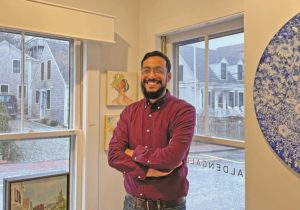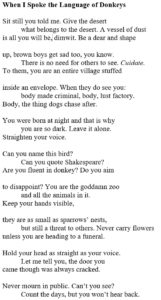“I was born and raised in El Paso, Texas,” says Eduardo Martinez-Leyva, a fellow at the Fine Arts Work Center in Provincetown who will give an online poetry reading on Saturday, Feb. 26. “For everyone in my family, our first language is Spanish. I had a single mom and three older brothers. There’s a huge age gap. I’m the baby.”
Having supported himself in recent years as a teacher, Martinez-Leyva says that being here on a seven-month winter fellowship has provided him with an opportunity “to focus on my writing, going back to this little boy from Texas who didn’t speak English initially, who was too effeminate. I think it’s a way to investigate my upbringing, to question images of masculinity.”
In El Paso, he says, he wore hand-me-downs from his much older brothers: “ ‘Why is he wearing bell-bottoms? Oh, this kid is edgy!’ I grew up having thick skin. I had waxed hair, wore black nail polish. It didn’t go over well.”

It took him many years to embrace becoming a writer. “Because English is my second language, it didn’t feel as if the realm of literature was where I belonged,” he says. “I was placed in an English-only school when I was in fifth grade. I could always understand what was going on, but it was hard for me to put everything together. I felt a little demoralized.”
Chatting comfortably in a Commercial Street gallery, Martinez-Leyva evinces a deep humility about himself and his work, even though his poems are filled with bold and physical images: “I was her corked migraine,” he writes of his mother in “At First Blush” — “small enough to make a fist, and stuff it in my mouth.”
He came into his own while attending the University of Texas at El Paso. “That’s when I found out who I was,” Martinez-Leyva says. “Before, I think I was just experimenting. Then, I realized, yeah, I’m totally gay.”
Academically, however, “I was still very aimless,” he says, until he took a creative writing course with Emmy Perez, an activist poet who had been a fellow at FAWC. “It was like kismet: she said my fiction wasn’t really making sense and fostered the idea that I should try poetry.”
After graduating, “I had to pause to help out my family for a bit,” he says. “I tutored at a community college. A lot of my students were just coming across the border at Juarez.”
A few years later, he left to get an M.F.A. at Columbia University and ended up erasing a lot of his early poems. “They didn’t feel authentic to what I wanted to say,” he says. “I was holding back — there was this trepidation that I wasn’t going to connect with an audience. It was frustrating getting rid of things but also liberating.” His work got more suggestively erotic: “Tonight, we’ll see/ whose arrow is the first to touch the sky,” he writes in “Now, You’re Talking.”
 His mentor was Lucie Brock-Broido. “She was my fairy godmother of poetry,” Martinez-Leyva says. “She took me under her wing, introducing me to the city and to other writers. She, too, was a FAWC fellow and told me about this place.”
His mentor was Lucie Brock-Broido. “She was my fairy godmother of poetry,” Martinez-Leyva says. “She took me under her wing, introducing me to the city and to other writers. She, too, was a FAWC fellow and told me about this place.”
He had a teaching scholarship at Columbia and continued to teach after earning his degree, including a job in Washington, D.C. at Georgetown Day School. “But,” he says, “I was burning out.” He yearned to have time to write. “That’s when I applied here.”
Being a fellow “has been great,” he says. “I had a lot of images bottled up, and in the first month, the poems just kept coming. I’m working right now on two narratives: about my childhood — growing up queer and the images I would see at the time — and the narrative of my siblings. My brothers are recovering alcoholics. One of them ended up getting deported.”
Provincetown has also become a character in his work, especially since he’s been “exploring the scene here,” Martinez-Leyva says. “At the A-House, in the Macho Room, I became fascinated with the things that I saw. I wrote a poem on my phone. It began to draw attention from other folks.”
Though he says he’d like to try writing poems in Spanish, “It doesn’t feel quite right yet.” And he’s not ready to return to Texas. “Maybe down the road, but not at this point of my life,” he says. “Once I left, I really found my people. In New York, they’ll say, ‘Doesn’t everyone like Buffy?’ No, I was bullied in El Paso for that.”
Border Lines
The event: A reading by Fine Arts Work Center writing fellows Eduardo Martinez-Leyva and Shastri Akella
The time: Saturday, Feb. 26 at 7 p.m.
The place: Via Zoom at fawc.org
The cost: Free
